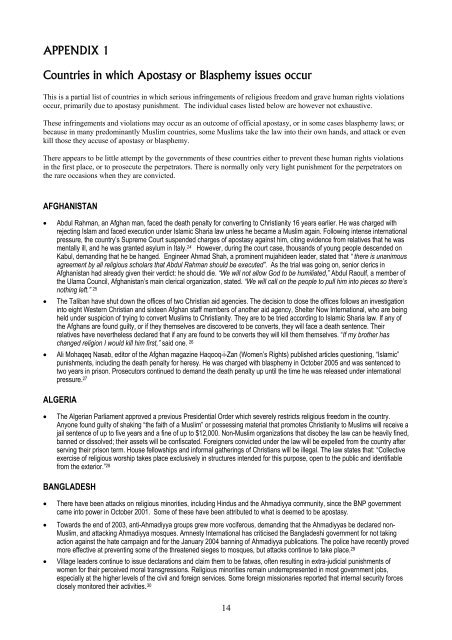Apostasy : An Overview - The Maranatha Community
Apostasy : An Overview - The Maranatha Community
Apostasy : An Overview - The Maranatha Community
You also want an ePaper? Increase the reach of your titles
YUMPU automatically turns print PDFs into web optimized ePapers that Google loves.
APPENDIX 1<br />
Countries in which <strong>Apostasy</strong> or Blasphemy issues occur<br />
This is a partial list of countries in which serious infringements of religious freedom and grave human rights violations<br />
occur, primarily due to apostasy punishment. <strong>The</strong> individual cases listed below are however not exhaustive.<br />
<strong>The</strong>se infringements and violations may occur as an outcome of official apostasy, or in some cases blasphemy laws; or<br />
because in many predominantly Muslim countries, some Muslims take the law into their own hands, and attack or even<br />
kill those they accuse of apostasy or blasphemy.<br />
<strong>The</strong>re appears to be little attempt by the governments of these countries either to prevent these human rights violations<br />
in the first place, or to prosecute the perpetrators. <strong>The</strong>re is normally only very light punishment for the perpetrators on<br />
the rare occasions when they are convicted.<br />
AFGHANISTAN<br />
• Abdul Rahman, an Afghan man, faced the death penalty for converting to Christianity 16 years earlier. He was charged with<br />
rejecting Islam and faced execution under Islamic Sharia law unless he became a Muslim again. Following intense international<br />
pressure, the country’s Supreme Court suspended charges of apostasy against him, citing evidence from relatives that he was<br />
mentally ill, and he was granted asylum in Italy. 24 However, during the court case, thousands of young people descended on<br />
Kabul, demanding that he be hanged. Engineer Ahmad Shah, a prominent mujahideen leader, stated that “ there is unanimous<br />
agreement by all religious scholars that Abdul Rahman should be executed”. As the trial was going on, senior clerics in<br />
Afghanistan had already given their verdict: he should die. “We will not allow God to be humiliated,” Abdul Raoulf, a member of<br />
the Ulama Council, Afghanistan’s main clerical organization, stated. “We will call on the people to pull him into pieces so there’s<br />
nothing left.” 25<br />
• <strong>The</strong> Taliban have shut down the offices of two Christian aid agencies. <strong>The</strong> decision to close the offices follows an investigation<br />
into eight Western Christian and sixteen Afghan staff members of another aid agency, Shelter Now International, who are being<br />
held under suspicion of trying to convert Muslims to Christianity. <strong>The</strong>y are to be tried according to Islamic Sharia law. If any of<br />
the Afghans are found guilty, or if they themselves are discovered to be converts, they will face a death sentence. <strong>The</strong>ir<br />
relatives have nevertheless declared that if any are found to be converts they will kill them themselves. “If my brother has<br />
changed religion I would kill him first,” said one. 26<br />
• Ali Mohaqeq Nasab, editor of the Afghan magazine Haqooq-i-Zan (Women’s Rights) published articles questioning, “Islamic”<br />
punishments, including the death penalty for heresy. He was charged with blasphemy in October 2005 and was sentenced to<br />
two years in prison. Prosecutors continued to demand the death penalty up until the time he was released under international<br />
pressure. 27<br />
ALGERIA<br />
• <strong>The</strong> Algerian Parliament approved a previous Presidential Order which severely restricts religious freedom in the country.<br />
<strong>An</strong>yone found guilty of shaking “the faith of a Muslim” or possessing material that promotes Christianity to Muslims will receive a<br />
jail sentence of up to five years and a fine of up to $12,000. Non-Muslim organizations that disobey the law can be heavily fined,<br />
banned or dissolved; their assets will be confiscated. Foreigners convicted under the law will be expelled from the country after<br />
serving their prison term. House fellowships and informal gatherings of Christians will be illegal. <strong>The</strong> law states that: “Collective<br />
exercise of religious worship takes place exclusively in structures intended for this purpose, open to the public and identifiable<br />
from the exterior.” 28<br />
BANGLADESH<br />
• <strong>The</strong>re have been attacks on religious minorities, including Hindus and the Ahmadiyya community, since the BNP government<br />
came into power in October 2001. Some of these have been attributed to what is deemed to be apostasy.<br />
• Towards the end of 2003, anti-Ahmadiyya groups grew more vociferous, demanding that the Ahmadiyyas be declared non-<br />
Muslim, and attacking Ahmadiyya mosques. Amnesty International has criticised the Bangladeshi government for not taking<br />
action against the hate campaign and for the January 2004 banning of Ahmadiyya publications. <strong>The</strong> police have recently proved<br />
more effective at preventing some of the threatened sieges to mosques, but attacks continue to take place. 29<br />
• Village leaders continue to issue declarations and claim them to be fatwas, often resulting in extra-judicial punishments of<br />
women for their perceived moral transgressions. Religious minorities remain underrepresented in most government jobs,<br />
especially at the higher levels of the civil and foreign services. Some foreign missionaries reported that internal security forces<br />
closely monitored their activities. 30<br />
14








